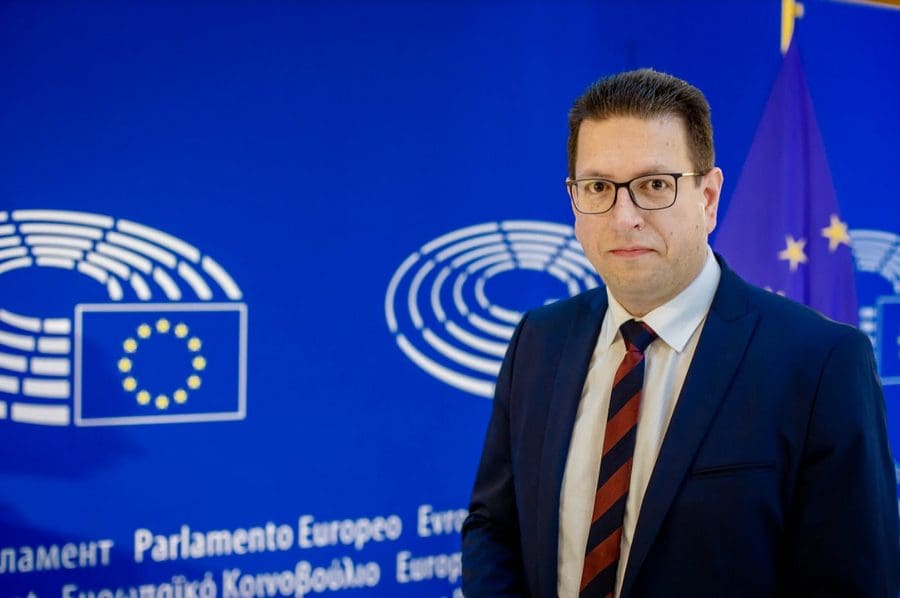Loránt Vincze is a Hungarian Romanian politician currently serving as a Member of the European Parliament for the Democratic Alliance of Hungarians in Romania (RMDSZ), within the EPP Group. He is also the president of the Federal Union of European Nationalities (FUEN).
Romania has recently been denied accession to the Schengen Zone. How was the decision perceived by the Hungarian minority in Romania? How does this decision affect Hungarians in Romania, their movement, families, and cultural relations with Hungary?
First of all, it’s a sad decision. It’s undeserved, as Romania and Bulgaria are practically already part of the Schengen area, it is just the last step towards full membership, control-free border access that was denied because of Austria. It was the veto of one country that made control-free travel impossible for Romanians. Romania has been ready for more than 11 years to enter the Schengen area; it has fulfilled all technical criteria, and there have been several monitoring groups sent, and evaluations made by the European Commission and individual member states. And all these evaluations had the same conclusion: that Romania is ready, that all the systems are in place that can ensure the effective control of the external borders and thus ensure the border defence of the Schengen area.
The decision is even more disappointing considering that Romania had to fulfil additional political criteria as well that were somehow linked to the accession to the Schengen area, and these were the fight against corruption and the independence of the judiciary. All these conditions were fulfilled, and eventually the Commission lifted the monitoring of Romania under the Cooperation and Verification Mechanism. And despite all that, the Schengen accession failed. Austria came up with arguments that have nothing to do with Romania. They have a problem with illegal migration, but it is their internal issue, it is about the political challenges that the ruling party faces and Romania became the victim of these internal political games. We are hopeful that 2023 will be the year when Romania will be allowed to enter the border-control-free area.
As far as the Hungarian community is concerned, of course an important part of the community lives near Hungary, in the border area.
Many live or work in Hungary, and for them, it’s an everyday hassle to pass the border and to have to face ID controls. There are many families and friends divided for basically no reason. But again, I hope this will change in 2023.
You participated in the Minority SafePack initiative from the very beginning, aiming to protect minority rights on the European level. What is your take on the decision [of the European Commission] not to start legislating on the issue? Is there still a chance for EU legislation in the field of minority rights?
I have been working on this project since the beginning. I am the coordinator of the Minority SafePack initiative which began more than ten years ago. Its purpose was to give a package of legislative proposals to the European Union so that it would defend minority languages and cultures with concrete action, with concrete legislation. First, the European Commission did not even want to register this initiative saying that it is beyond the competencies of the EU. But later, we won the case at the EU Court in Luxembourg. And this made it possible in 2017 to start collecting signatures for the initiative, because according to the Lisbon Treaty, one million European citizens can ask the European Union to legislate in some area. So, when we collected 1,200,000 signatures in 2018, we presented it to the European Commission. The final verdict came on in January 2021, saying that the Commission likes the proposal very much, they appreciate the big number of signatures, but since the European Union has already put in place so many policies and has taken so much action regarding minorities that no further steps are necessary. And
for us it is a very disappointing answer since we do not sense this alleged concern for minorities or a lot of positive action towards them.
Instead, in terms of many communities we witness legal breaches by the majority countries, non-implementation of national legislation. Minorities in many regions face assimilation and language loss. So, the claim that everything is just fine and there have been many legal acts that already support minorities is simply not true. It’s a parallel reality. And for that we appealed the decision. We turned to the European General Court in Luxembourg and the verdict came in November, saying that the Commission is right, and indeed no further steps are necessary. We have still one legal action we can resort to. We can appeal the decision of the General Court at the Tribunal of the European Union. It will be again around two years before a verdict will be rendered.
Overall, we need to see that minority rights legislation should indeed remain a member state competence,
but when a member state does not do its duty towards the minorities living on its territory, providing them with the necessary legislative framework and implemented legislation to ensure that they are able to keep their language, they are able to have education in their mother tongue, then intervention at the European level should be necessary. What we have at the level of the European Council is insufficient because there we have two legal instruments, the Framework Convention and the Language Charter that are part of an international treaty system, but if member states don’t implement it, there are no sanctions. Basically, the states can do whatever they want with impunity. The European Union that is more and more a community of values that has more and more competences, overlooks the issue of national minorities and we believe that is wrong. There are many minority groups that receive the necessary attention from the European Union. For example, the LGBTQ community or the Roma community, yet
national minorities are always overlooked. Their issues are not considered important.
And we know the reason behind this: there are some member states that have their own historical sensitivities, and they don’t want European legislation on minority rights because that would mean that they must put their own house in order. 50 million Europeans who belong to a national minority are not protected by anti-discrimination legislation. To sum up, it is a lack of European policies and European actions that we hope we will be able to change in the upcoming years.
How would you describe their situation in Romania and what is their relationship like with Hungary?
The situation of the Hungarian community in Romania has improved a lot since the fall of communism. Under communism, for 50 years ethnic Hungarians had no rights. Since the fall of the communism, it has become possible to build up very slowly a set of legal guarantees, pieces of identity-related legislation.
There are some extreme examples in Europe, for instance minorities whose very existence is not recognized by the state where they live. For example, Greece does not recognize the Turkish minority living on its territory or France does not recognize in its constitution the Breton, the Alsatian, the Occitan, the Basque or the Catalan language groups. If we compare the situation of the Hungarian community to those extremes than we can say that the Hungarians in Romania are somewhere in the middle, because we have a set of individual rights. To give you an example: if there are enough Hungarians in a settlement, making up at least 20 per cent of the population of a municipality, we can have bilingual signs. We can also use our mother tongue for official communication, and we have education from kindergarten to university and even doctoral studies in our mother tongue, Hungarian. Nevertheless,
we don’t have community rights, we cannot make decisions at community level in any relevant policy area.
It is still decided in a Bucharest ministry whether in a school there will be a new Hungarian language class, or if a new Hungarian school can be established. It is all still very much centralized, and the community cannot manage its own cultural and educational institutions. What would be desirable would be some sort of collective autonomy, which, for example, in Finland Swedish speaking people have, or a territorial version of autonomy like the one in Italy, in the South Tyrol region, of which the German speaking and the Ladin community are the beneficiaries. Unfortunately, in Romania it is not possible today to have a meaningful dialogue with the political majority on autonomy, about the possibility of giving a community the right to decide on the matters that concerns them. Because Romania is still entrenched in this 19th century reality that there should be one culture, one language and all the others are not equal to the Romanian language, to the Romanian culture. We don’t feel like equal citizens, rather like tolerated citizens at most, and we feel that we are not entirely parts of the Romanian society. I believe that for any state it is essential to give to its minorities the right legislative framework so that the community feels represented, feels protected, feels cherished, feels included in society and thus it can become more loyal and it contributes better to social peace and to geopolitical stability.
Romania is a young democracy: it has been a democracy for only 35 years.
Maybe more time is needed in order for the majority society to recognize that the minorities don’t want to take anything away from it,
and the fact that they have rights does not mean that the majority has fewer rights or that they have to give something up for the sake of the minorities. As the UN approach to minority rights is that minority rights are human rights, I think the objectives that we have in Romania and at the European level are absolutely in line with the objectives of a modern society.
You mentioned that there are measures to protect and preserve the identity and rights of Hungarians in place in Romania. But are these measures sufficient to preserve the Hungarian identity of young Hungarians living in Romania?
Well, there are several issues here. One is the legislative framework and as I told you, we would like to have more of that. Individual rights are not enough to preserve the identity of the community. Secondly, we need to speak about financial means, financial resources, in order to have schools, to have all the necessary cultural institutions, sport institutions, all the infrastructural investments in the Hungarian regions or in the municipalities where Hungarians live. And from this point of view, we can witness better and not so good periods. When my party, the Democratic Alliance of Hungarians, RMDSZ, is in the government, then we are able to allocate more financial resources also to the Hungarian regions, to the Hungarian municipalities. When we are not in the government, this support is not there.
But we also receive invaluable financial support from Hungary. And from this point of view, in the last decade, there have indeed been massive investments in culture, in the economy, in sports infrastructure in Romania. Just over the past few months, more than 500 Christian churches have been restored in Transylvania, several kindergartens and nurseries have been built. Many educational establishments were renovated or have been established.
These huge investments will definitely greatly contribute to preserving the identity of Hungarians.
It has been a very important symbolic investment on the part of the Hungarian government, a closer-to-the-hearts type of approach give dual citizenship to Hungarians living across the border because for us it meant that we are recognized as full members of the Hungarian nation. We can vote in the Hungarian national elections, and we can feel being fully included in Hungarian society. This meant a lot not only to the Hungarians in Romania, but to Hungarian ethnic minorities in all other countries. I think there has been an immense change of policy since the Orbán government took office towards the Hungarians in Romania and Hungarians abroad generally.
As you said, the cooperation between the Hungarian minority and the Hungarian state is strong, but what about the relationship between Hungarian minority groups living in different neighbouring countries? Is there any interaction (political or cultural) between the Hungarian communities in Ukraine, Slovakia and Romania?
There are thousands of ties that link us Hungarians to each other. These ties are not only with the mother country, Hungary, but also between the various cross-border communities as well. And there are several levels of cooperation because of course we meet at the forum of the Hungarian elected representatives, local and parliamentary, then we meet also at the level of our organizations at the Hungarian permanent forum in Budapest. But my organization, the Federal Union of European Nationalities, is also a forum where all the Hungarian communities are represented by their organizations and we have the opportunity to present the aims and objectives of the Hungarian communities on the European level, through the largest umbrella organization of minorities, FUEN. The organisation is also financially sponsored by the Hungarian government.
Over the past decade, we have built a very strong project for minority protection at the European level. All Hungarian minority groups are part of that project, and so are several minority organizations from all over Europe. That is how it was possible to get more than one million signatures for the Minority SafePack initiative—as you know, the other condition for the initiative to be valid was to have those signatures from at least nine member states. In the end, we had from more than 11 member states.
So I believe it is really important that we meet each other regularly, that we have common projects, and we share good practices.
Of course, we live under different conditions, we are different in terms of our numbers. So, the largest Hungarian communities, of course besides the Hungarians in Romania, are Hungarians in Slovakia and then the Hungarians of Serbia, in Vojvodina.
As the Hungarians in Romania and also the Hungarians in Vojvodina are represented in the national government. We are full members of the political establishment in our respective countries, unlike in Slovakia, where, unfortunately, the political representation is not as strong as to enable ethnic Hungarians to send representatives to the national parliament, despite their numbers being quite high. In fact, almost 10 per cent of the population of Slovakia is Hungarian but due to different political disputes, parliamentary representation has not been achieved, but we are helping them. We are trying to provide them with expertise so that they are successful in the next elections.
What about the Hungarian minority in Ukraine?
Yes, we tend to speak about the Hungarians in Ukraine as a distinct group, especially now with the war, because this community has been in a very difficult situation, and we have been trying to show our solidarity with them by providing all financial and other assistance possible in the past months. But the Hungarians of Transcarpathia were in a dire situation even before the war began, in terms of minority rights, because Ukraine has changed several laws concerning the Hungarian community over the years. The language law and the education law have been modified, and even the constitution has been amended to downgrade the existing minority rights to an inferior level. This means, for example, that
Hungarian language education is not possible anymore or only in private establishments,
which is contrary to the international agreements signed by Ukraine. So, it has been a process that started before the war and we believe that when peace returns in Ukraine, solving the minority issues should be one of the most important objectives in the country. Unfortunately the recently adopted minority law in Ukraine fails to provide the necessary measures and guarantees. I think that Ukraine should guarantee a wide range of rights to the minorities living on its territories, not only to the Hungarians, but to the Romanians, Greeks, Poles, many, many communities that deserve to be considered an integral part of Ukrainian society while allowed to preserve their own language and their own culture.








